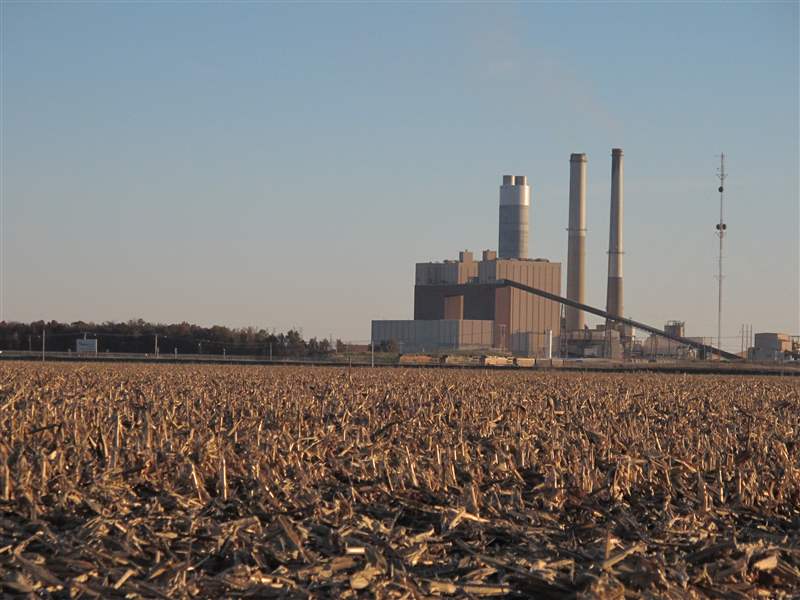
AT A CROSSROADS
Future of Illinois coal-fired power plant worries towns
Southern Ill. town frets about coal plant's future on eve of Illinois pollution board decision
11/21/2013
Ameren Corp.’s power plant rises from beyond a freshly harvested cornfield outside Newton, Ill., population 2,850. Newton residents fear environmental regulations could force its closing.
ASSOCIATED PRESS

Ameren Corp.’s power plant rises from beyond a freshly harvested cornfield outside Newton, Ill., population 2,850. Newton residents fear environmental regulations could force its closing.
NEWTON, Ill. — Tiny Newton swaddles itself in all things Burl Ives, the folksy Oscar-winning actor who hailed from around the southern Illinois farm town of 2,850. The Embarras River bridge bearing his name is along the way to the rural graveyard where since 1995 he is spending eternity, and there is a push to raise $35,000 to pay for an Ives memorial on the town square.
But Newton’s identity may be more about a 36-year-old electric plant that’s easily recognized by its towering smokestacks, employs some 200 people, and is considered by locals a regional economic gem. Now, as an effort continues to move Illinois away from coal-based energy, some here worry about the plant’s future — and the town’s reliance upon it.
Houston-based Dynegy Inc. wants to buy the coal-fired plant and four other Illinois units from Ameren Corp. The caveat: Dynegy wants the same waiver St. Louis-based Ameren got from the state — delaying installation of required soot-control upgrades until 2020 — or the deal could be off.
The Illinois Pollution Control Board will decide that today, a ruling that’s certain to be closely watched in affected nearby communities. Several hundred people work at those plants, which the companies have said contributed more than $1 billion to the economy, explaining why local officials have campaigned for Dynegy.
If the board denies Dynegy’s request and the company aborts the acquisition, St. Louis-based Ameren probably would try to find another suitor, or ask regulators and Indiana-based nonprofit Midcontinent Independent Transmission System Operator if it could close one or more, said Andy Smith, a St. Louis-based Edward Jones analyst.

Mark Bolander, mayor of Newton, worries that the power plant faces a clouded future as Illinois regulators decide whether to give Dynegy Inc. more time to install pollution controls.
That’s no small matter in any of the affected towns, where populations average just 5,700, and several are considerably smaller.
In Newton, Mayor Mark Bolander said roughly half of the city’s property tax revenue comes from the power plant, with much of that going toward the local 1,400-student school district already crimped by state funding cuts.
Losing that income could cripple city and school services, forcing homeowners and farmers to make up the difference.
“If we lose this plant, I see this town drying up. I think it will be that bad,” George Hesser, a 63-year-old retiree and Vietnam vet, said while staffing his wife’s Newton gift shop. A ruling benefiting Dynegy, he insisted, “is survival for us.”
Coal-fired power is at a crossroads in Illinois as environmental regulations and natural gas competition gain momentum.
“The moral of the story is, if these plants are so impure and polluting our downstate community, then why is this one of the richest areas as far as Mother Nature is concerned?” Mr. Bolander said. “We’re not saying it’s OK to pollute. All we’re saying is we need more time.”